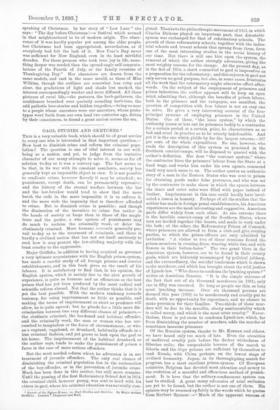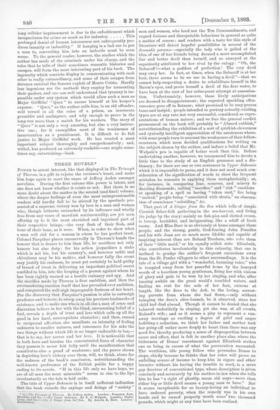GAOL STUDIES AND SKETCHES.* VMS is a very valuable book,
which should be of great service to every one who is interested in that important question,— How best to diminish crime and reform the criminal popu- lation ? The question is one of vital interest to our well- 'being as a nation, and yet, to judge from the tentative character of our many attempts to solve it, seems as far off solution to-day as it was a century ago. The fact seems to be that, in its war with its constant assailants, society has generally kept an impossible object in view. It is not possible to eradicate crime, however fiercely it may be attacked ; no punishment, except death, can be permanently repressive; and the history of the eternal warfare between the law and the law-breaker would tend to show that the more harsh the code is, the more impossible it is to enforce it, and the more wide the impunity that is therefore afforded to crime. But to diminish crime is possible ; and though the diminution of the incentive to crime lies rather in the hands of society at large than in those of the magis. trate and the gaoler, a wise system of punishment may do much to reclaim the criminally weak, or deter the obstinately criminal. More humane counsels generally pre- vail to-day as to the treatment of criminals, and there is hardly a civilised nation that has not set itself anxiously to seek how it may protect the law-abiding majority with the least cruelty to the aggressors.
Major Griffiths, in addition to having acquired as governor a very intimate acquaintance with the English prison-system, has made a careful study of all foreign prisons and convict establishments, and in this book gives us the result of his labours. It is satisfactory to find that, in his opinion, the English system, which is mainly due to the slow growth of experience, is quite as humane and as efficacious as the beet prison that has yet been produced by the most radical and scientific reform abroad. Not that the author thinks that it is yet the best possible. With the modern tendency towards leniency, for using imprisonment as little as possible, and making the terms of imprisonment as short as prudence will allow, he is quite agreed; but he pleads for a little more dis- crimination between two very different classes of prisoners,— the obstinate criminal, that hardened and habitual offender, and the criminally weak, the man or woman who has sue- oumbed to temptation or the force of Circumstances; or who, as a vagrant, vagabond, or drunkard, habitually offends in a less criminal fashion, and yet grows to look upon the gaol as his home. The imprisonment of the habitual drunkard, as the author says, tends to make the punishment of prison a farce in the case of more serious offenders.
But the most needed reform which he advocates is in our treatment of juvenile offenders. The only real chance of diminishing the criminal population lies in the reclamation of the boy-offender, or in the prevention of juvenile crime. Much has been done in this matter, but still more remains. Until the passing of the first Reformatory School Act in 1854, the criminal child, however young, was sent to herd with his elders in gaol, where his criminal education was naturally coin- 0 Secrets of the Ptison.Heuse; or, Gaol Studios and Sketches, By &Nor Arthur Griffiths. London. Chapman and Hall. pleted. Thanks to the philanthropic movement of 1851, in which Charles Dickens played an important part, that detestable system was exchanged for that of reformatory schools. The growth of these reformatory schools, together with the indus- trial schools and truant schools that sprang from them, form one of the most interesting studies in the social history of our time. But there is still one blot upon the system, the removal of which the author strongly advocates, giving the most weighty reasons for the change. At the present day, as in the Act of 1854, a short committal to gaol is imperative as a preparation for the reformatory; and this sojourn in gaol not only serves no good purpose, but also, in some cases, frustrates all the work that the reformatory might otherwise effect after- wards. On the subject of the employment of prisoners and prison industries, the author appears still to keep an open mind, admitting that, although the benefits of prison labour, both to the prisoner and the ratepayer, are manifest, the question of competition with free labour is not an easy one to solve. He gives a very interesting account of the four principal systems of employing prisoners in the United States. One of these, "the lease system," by which the authority leases or lets out its prisoners bodily to a contractor for a certain period at a certain price, he characterises as so bad and cruel in practice as to be utterly indefensible. And yet it is the one which yields by far the largest returns,-267 per cent. of the whole expenditure. No one, however, who reads the description of this system as practised in the Southern convict-camps, will be disposed to quarrel with the author's definition. Nor does "the contract system," where the contractor hires the prisoners' labour from the State at a fixed wage, and works him under his own agents, commend itself very much more to us. The author quotes an authentic story of a man in the Eastern States who was sent to prison for obtaining goods under false pretences, and who was set by the contractor to make shoes in which the spaces between the inner and outer soles were filled with paper instead of leather. Imprisonment in this case could hardly have incul- cated a lesson in honesty. Perhaps of all the studies that the author has made in foreign penal establishments, his American experiences are the most interesting and suggestive. American gaols differ widely from each other. At one extreme there is the horrible convict-camp of the Southern States, where men are herded together like beasts, and made to work under the lash •; at the other, the Reformatory Prison of Concord, where prisoners are allowed to form a club and give evening parties, to which the prison-officers are only admitted by invitation. "A visitor to two of these reunions found the prison-members in evening-dress, wearing white ties, and with flowers in their button-holes." The two great blots in the A.merican system, however, are to be found in their county gaols, which are hideously mismanaged by political jobbery, and the extraordinary, the suicidal tenderness which is shown to the murderer, and which has brought about the wild justice of Lynch-law. "Who dares to condemn the lynching system P " writes an American Senator. "It is the simple outcome of the fact that out of six thousand murderers (in 1891), only one in fifty was executed. So long as people see this, so long must lynching increase. Over six thousand persons are doomed this year (1892) to be murderously and cruelly put to death, with no opportunity for repentance, and no chance to make provision for their families. Two-thirds of these mur- ders will be due to the maudlin, slushy sentimentality which is called mercy, and which is the most utter cruelty." Never- theless, there is yet room to condemn Lynch-law, which, far from diminishing the number of murders, adds the murder of sometimes innocent prisoners.
Of the Russian system, thanks to Mr. Kennan and others, we have heard only too much of late. Even the atrocities of mediatval cruelty pale before the darker wickedness of Siberian exile; the unspeakable horrors of the march to Siberia and the Haps prisons are sufficient by themselves to rank Russia, with China perhaps, on the lowest stage of civilised humanity. Japan, in its thoroughgoing search for progress, has a most excellent prison-system. Of European cotintries, Belgium has devoted most attention and money to the evolution of a merciful and efficacious method of punish- ment. It is here that the solitary-confinement system can best be studied. A great many advocates of total seelnsion are yet to be found, but the author is not one of them. His opinion may be summed up fairly in the words which he quotes from Herbert Spencer :—" Much of the apparent success of long cellular imprisonment is due to the enfeeblement which incapacitates for crime as much as for industry This prolonged denial of human intercourse not unfrequently pro- duces insanity or imbecility." If banging is a bad use to put a man to, converting him into an imbecile must be even worse. To the general reader, however, the studies which the author has made of the criminals under his charge, and the tales that he tells of their sometimes romantic histories and escapes, will form the most interesting part of his book. The ingenuity which convicts display in communicating with each other is really extraordinary, and some of their escapes from durance outrival the famous exploit of Monte Cristo. Hardly less ingenious are the methode they employ for tormenting their gaolers, and one can well understand that tyranny is im- possible under any system which would allow such a man as Major Griffiths' " Quex " to amuse himself at his keeper's expense. " Quex," as the author calls him, is an old offender, well versed in all the rules of a prison, an inveterate grumbler and malingerer, and wily enough to prove in the long, run more than a match for his warders. The story of " Qttex " is not only a very amusing, but also a very instruc- tive one ; for it exemplifies most of the weaknesses of incarceration as a punishment. It is difficult to do full justice to Major Griffiths' work. He has treated a most important subject thoroughly and comprehensively ; and, withal, has produced an extremely readable—one might some- times say, entertaining—book.







































 Previous page
Previous page